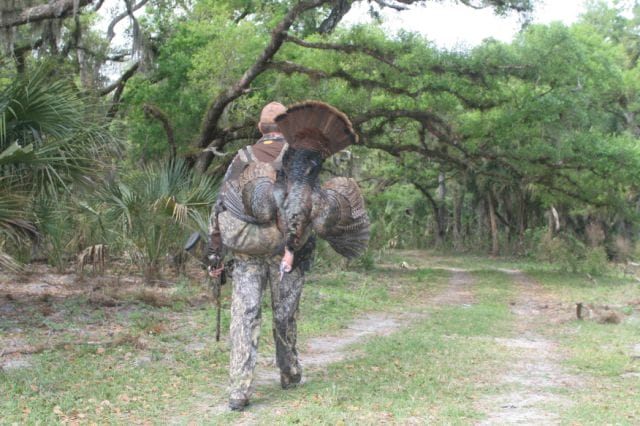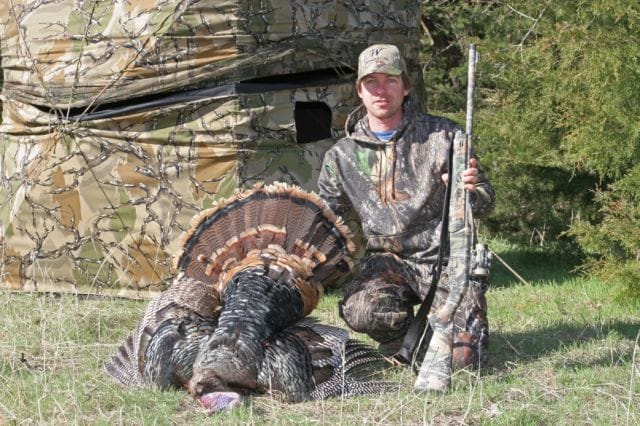by David Hart
First, the bad news… turkey season is winding down, and you’ve still got a tag or two in your wallet.
If that’s not enough, there are fewer birds in the woods, and those that remain are educated by a season’s worth of hunting pressure. It’s tempting to throw in the towel and hang up the turkey vest until next spring.
Don’t. Not yet. There’s plenty of good news. As long as you have a week or even a day left, you’ve got a chance at killing a bird—a good chance. Just ask Chris McClellan. As an outfitter who runs a full season of guided turkey hunts in southern Virginia, he’s in the woods right up until the final day. His success rate is just as good at the end of the season as it is in the beginning.
Get Loud
Although McClellan hunts 4,200 acres of prime southern Virginia real estate, he’s hunted nearly every bird on the land at least once. Those that haven’t been killed or spooked to onto neighboring land need to be hunted differently. Late-season birds are different. While many hunters take a softer approach, McClellan will sometimes get more aggressive.
“I’ll try to get within 75 yards of a roosted gobbler where I tried to stay 100 or even 150 yards away earlier in the season,” he says. “The trees are leafed out, so you can get a little closer without being seen.”
Sneaking a little closer to a roosted gobbler offers a few advantages. First, notes McClellan, they may be more willing to slip in for a quick look, especially if they don’t have any hens with them or if there are several gobblers roosted together. Those bachelor gangs are the most vulnerable, and McClelland will actually call louder and more frequently if he knows there is more than one bird in front of him.
“Sometimes you have to really hammer them to get them fired up,” he says.
Once they respond with a few gobbles, though, he’ll quit calling. A duo or trio of gobblers will still try to beat their brothers to the hen, so there’s a good chance they’ll come in fast, even if they stop gobbling.
“If they answer me, there’s a good chance I’ll get one within range,” he says.
Tone It Down
Late-spring hens usually don’t yelp, cluck and cut much, though. You shouldn’t either, at least not at first.

Call softly and sparingly to pressured birds. Late-season gobblers have heard lots of loud, aggressive calling and have learned to stay away from it.
Loud, aggressive yelping, cackling and clucking may actually push a solo gobbler away, especially one that’s been hunted for several weeks. In other words, it pays to call sparingly and quietly to pressured birds. Or in some cases, it can be wise to not even call at all. If he’s close to a lone gobbler, McClellan will wait until fly-down time and imitate the sound of a hen leaving the roost.
“I’ll just slap my hat against my thigh real quick to sound like wings beating, and then I’ll scratch the leaves like I’m imitating a hen feeding. I like to wait until I know he’s on the ground, and then I’ll make some light clucks and purrs,” he says.
Remember, those gobblers that remain are survivors. They’ve heard it all, and they’ve likely been bumped a few times, which means they might take just a few minutes to close the distance or they could take an hour. Or they may not come in at all. Be patient. McClellan will stick it out until he kills the bird or he’s confident it’s not coming.
If a bird gobbles as he walks the other direction, it’s not a bad idea to circle around and try to cut him off. Why not? You’ve got nothing to lose. That only works if the terrain allows it, and it’s a good idea only if you know the land.
Ambush ’em

Setting up a ground blind on a field or known strutting area can pay off when gobbling activity is low or the birds aren’t responding to calls.
Some late-season gobblers will continue to strut, so McClellan will sometimes set up a ground blind on a known strutting area and wait. And wait, and wait. Sooner or later, they’ll show up.
“Some gobblers are done towards the end of the season. They won’t gobble, they won’t respond to calls,
and they aren’t strutting anymore. They’ve moved out of the breeding phase and back into their everyday patterns of survival,” he says. “That’s when I wait it out and hope one comes by me.”
He usually sets up in a field. Turkeys will abandon fields that have grown up, even if they’ve frequented them early in the season. They don’t like walking through tall grass. However, pastures that are grazed continue to attract turkeys, which feed on bugs, greens and seeds in close-cropped fields.
It may not be the most exciting way to notch a turkey tag, but if the clock is winding down, it may be the best way to fill that last tag. As long as there is time left in the season, you might as well hunt hard until the last second.
For more information on a guided turkey hunt, visit www.sailorscreekoutfitters.com.
The Union Sportsmen’s Alliance website is designed to provide valuable articles about hunting, fishing and conservation for members of AFL-CIO affiliated labor unions and all sportsmen and sportswomen who appreciate hunting and fishing and want to preserve our outdoor heritage for future generations. If you would like your own story and experience from the outdoors to be considered for our website, please email us at USAmembers@unionsportsmen.org.




